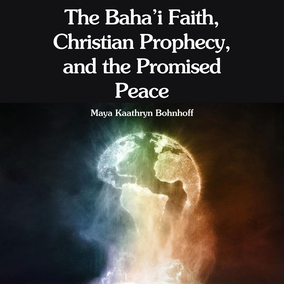The views expressed in our content reflect individual perspectives and do not represent the authoritative views of the Baha'i Faith.
Baha’is believe that Baha’u’llah brought the latest global revelation of God’s plan to the world. As a prisoner and an exile, he founded an entirely new Faith, which has spread across the entire world. While the Baha’i Faith began in the middle of the 19th Century, Baha’is understand that all Faiths come from the same Source, and that God’s loving message to humanity is progressive, continual and everlasting. Baha’is believe in the oneness of God, the oneness of religion and the oneness of humanity; and Baha’is all around the globe actively work for the realization of those ideals of peace, harmony and unity.
RELATED: We Live in Revolutionary Times—Why?
Most importantly, Baha’is believe we all have an immortal soul that longs for a mystical connection with God. The Baha’i teachings say that our nature is fundamentally spiritual, which means the reflection of the divine perfections can potentially appear in the noble reality of each human soul.
From that spiritual perspective, the Baha’i Faith advances a set of principles, revealed over a hundred and fifty years ago, which encompass the defining social and moral imperatives of our times. Baha’is understand this as purposeful and not accidental, believing that the divine energy, the Word of God, has now been directed into these new causes, whose time has finally come. These principles are:
- The oneness of humanity: We are part of one giant, interrelated, and slowly unifying system, which must be treated and respected as a whole.
- The independent investigation of truth: Blind acceptance of dogma or tradition does not foster personal or social growth – so each person must search for and determine what they believe.
- The common foundation of all religions: All religions have sought to safeguard the nobility of man and advance social order, and every major Faith worships the same God.
- The essential harmony of science and religion: Unbalanced and dangerous by themselves, religion and science ultimately agree.
- The equality of men and women: The two human genders function like the wings of one bird, and must be equally developed for the bird to fly.
- The elimination of prejudice of all kinds: Prejudice may be the greatest barrier to peace – Baha’u’llah writes “The well-being of mankind, its peace and security are unattainable unless and until its unity is firmly established.”
- Universal peace upheld by a world government: This global democracy must include a world parliament, a world judiciary, and a world executive to protect the human rights of all people.
- Universal compulsory education: Lack of an education not only wastes human potential, it creates an environment in which misinformation often guides and uncritical fanaticism directs actions.
- A spiritual solution to economic problems: This must include the elimination of abject poverty and destitution along with the disappearance of the gross accumulation of ownership.
- A universal auxiliary language: So that we may all easily communicate.
The overarching goal of these principles — to eliminate the barriers that keep people apart, and thereby establish the peace and the oneness of humanity – constitutes the chief and distinguishing feature of the Baha’i Faith and the cornerstone of Baha’u’llah’s world-embracing vision.

Simply, if you believe in that message, and in the Messenger who brought it, you’re a Baha’i.
RELATED: My First Baha’i Community
Becoming a Baha’i involves a joint decision of your mind, heart and soul. It requires no baptism, initiation or ritual. Because no Baha’i clergy exists, the decision belongs to you alone. When you do decide to become a Baha’i, you just let your local Baha’i institution – typically a Local Spiritual Assembly – know about your decision. They will happily enroll you, usually with a simple declaration card.
You’ll be joyfully welcomed into the most diverse community on Earth.
You May Also Like
Comments

















God is the Father, God is the Son, God is the Holy Spirit When we say father Son and Holy Spirit that the Father, the Son, and the Holy Spirit are not the same, that each of them is also self-aware that can refer to himself as “I,” and that they relate to one another in certain ways
(Isaiah 61:1, Mark 1:9–11, etc.). In this respect, therefore, God is not one, but three.
They did not mean there are three Gods (Father, Son, & Holy ...Spirit)
Now this is the true Christian faith: We worship only one God
Genesis 1: 26 Then God said, “Let Us make man in Our image.
Why did God say let us? because God the Father God the Son Jesus Christ and God the Holy Spirit.
John: 14: 9 Jesus answered: “Don’t you know me, Philip, even after I have been among you such a long time? Anyone who has seen me has seen the father. How can you say, ‘Show us the Father’?
Thank you, Lord Jesus, for dying on the cross I will die for you I will give my life to you at any time.
John 5: 22 Moreover, the Father judges no one, but has entrusted all judgment to the Son,
John: 3.16 For God so loved the world that he gave his one and only Son, that whoever believes in him shall not perish but have eternal life.
John 14:6 Jesus answered, “I am the way and the truth and the life. No one comes to the father except through me.
Jesus is the door only door to heaven.